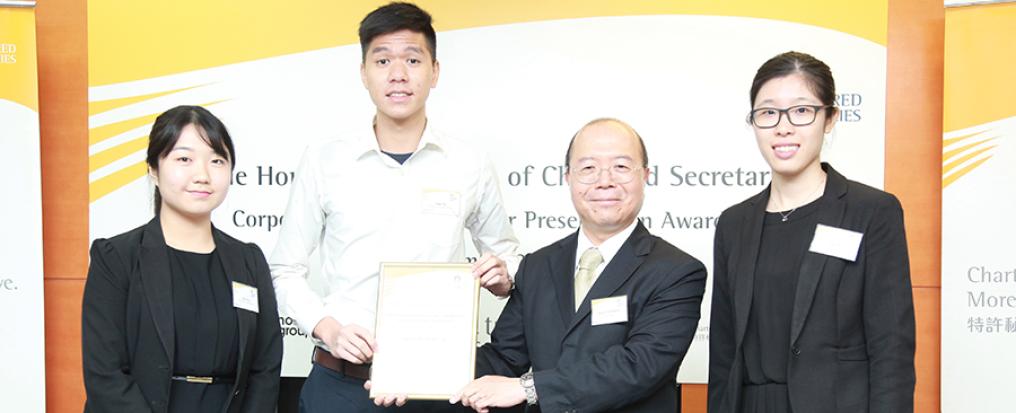Integrated reporting hopes to redraw the corporate bottom line with its measurement of non-financial 'capitals’. While only a few listed Hong Kong companies have adopted its principles, the International Integrated Reporting Council, under new leader Richard Howitt, believes that integrated reporting is already shaping the future of corporate reporting.
It was Peter Drucker, the celebrated American management guru, who reportedly declared, 'if you can’t measure it, you can’t manage it’. An oft-repeated mantra in the 1970s, Drucker's call for pertinent data seemed reasonable back then. Today, executives realise that so much of their decision-making is based on immeasurable data, whether it's the abilities of a new hire, the effectiveness of a leadership meeting, or consumer tastes of the future.
So too with the corporate bottom line: profit and loss is not the only performance metric. A broader picture would look at a company's governance and strategy, and the effect of a company on workers and the environment – elements not easily measured by traditional financial reporting methods.
Many movements to make companies more accountable for their environmental and overall societal impact emerged along with the environmental crusades of the 1960s. Industrial and environmental disasters – in particular the Union Carbide chemical poisoning of thousands in Bhopal, India, in 1984 – galvanised global protests.
The 1980s saw the popularisation of corporate social responsibility and the emergence of frameworks covering the environmental, social and governance (ESG) performance of companies. The raised expectations on companies’ ESG performance and reporting standards were first thought of as an expensive burden but by the early 1990s, such concepts – and the idea that the ability to identify issues that materially affect a business model or the ability to create long-term value would improve risk management – had become 'sustainability’.
In 2002, a Danish biotechnology company, Novozymes, produced the first example of what is today known as an integrated report. 'Our decision to bring everything together in one report is a natural consequence of business and sustainability moving ever closer together, and of various stakeholders asking for a wider overview of the business,’ Steen Riisgaard, a biofuels pioneer who was its chief executive officer until 2013, said at the time.
The idea of codifying integrated reporting into a single set of principles emerged in South Africa and the International Integrated Reporting Council (IIRC) was formed in London in 2009. Today, about 1,500 companies worldwide have switched to integrated reporting as set down by the IIRC Framework, launched at the end of 2013.
‘The IIRC Framework is a set of principles that covers an organisation's value creation beyond financial and manufacturing capital,’ says Wendy Yung FCIS FCS, Founder of Practising Governance, a consultancy that focuses on companies’ capacity building for corporate governance, and the Institute's Council member.
Driving adoption
At the core of the integrated reporting movement is the concept of the six capitals:
- financial
- manufactured
- intellectual
- human
- social and relationship, and
- natural.
Together they represent stores of value that are the basis of an organisation's value creation.
Only a few Asia-Pacific companies publish reports based on the IIRC Framework and in Hong Kong the adoption of integrated reporting by listed companies is a voluntary exercise. Among those that do are CLP Group, HSBC, Link REIT, Pacific Basin, Swire Pacific and a Mainland utility company, CGN Power.
‘Sadly, the great majority of Hang Seng Index companies have not taken up integrated reporting,’ notes Robert Gibson, an adjunct professor at The Hong Kong University of Science and Technology (HKUST) who teaches sustainability and environmental social and governance management and reporting.
Yet Calvin Lee Kwan, General Manager of Sustainability at Link REIT and a leading advocate of integrated reporting in Hong Kong, says integrated reporting is more common than widely thought. 'A lot of Asian companies are family businesses and some of the most sustainable businesses I know are family businesses,’ he says. 'They have long been aware of concepts such as treating employees well. They have been doing it for years.’
Mr Kwan believes integrated reporting will grow organically in Hong Kong because there is motivation. 'Listed companies such as Link REIT, Swire and CGN Power are now adopting integrated reporting as awareness of the importance of pre-financial information grows,’ he says. 'It is a way of telling people how you do business and helps businesses understand their business better.’
Two factors have raised the profile of integrated reporting in Hong Kong. The first was the amendment to the Companies Ordinance to require issuers to include a business review in their annual reports, reporting on environmental and employee matters that have a significant impact on the company. This is in line with international trends to promote corporate social responsibility.
The second was the introduction by Hong Kong Exchanges and Clearing Ltd (HKEX) of its Environmental, Social and Governance Reporting Guide. The Guide was originally introduced under the listing rules as a recommended practice in 2012. In 2015 the Guide was revised upgrading many recommended disclosures to 'comply or explain’.
‘Given the recent ESG disclosure requirement by the Hong Kong Stock Exchange, we do hear clients taking further steps towards integrated reporting,’ says Ivan Tong, Climate Change and Sustainability Services Partner at EY China.
Critical role model
Integrated reporting, according to Ms Yung at Practising Governance, is not just a reporting process. 'It is a whole new way of seeing the value creation process and there are some inspiring concepts,’ she says.
‘Company secretaries are members of management and they must keep the board updated on trends and the underlying drivers,’ says Ms Yung. 'They play a key role in corporate reporting and should advise the board on the best way to articulate its story. Company secretaries can further enhance their own strategic role at the same time.’
The introduction of ESG reporting requirements by the Hong Kong Stock Exchange captured the attention of company secretaries, says Mr Kwan. Whether that will lead to integrated reporting is a matter of debate. 'They have a lot to do already,’ he adds. 'I don’t think integrated reporting is at the top of their list.’
At this relatively early stage, the decision on whether to adopt integrated reporting – or some elements of the IIRC Framework – may well depend on the sector. 'In a sector like mining for example, ESG goes to the heart of the business. Without bearing the name “integrated thinking”, the company may already think beyond financial inputs for its business model,’ Ms Yung says. 'In this case, it seems to be a natural progression to consider integrated reporting.’
Company secretaries will have to work closely with other departments to monitor the preparation for, and introduction of, integrated reporting. 'You will see a lot of investors ask about integrated reporting,’ says Mr Kwan. 'Sometimes the corporate communications or the sustainability teams will be very interested as well. When someone asks what is necessary, what is required, that's when the company secretary input comes in.’
He agrees that forward-thinking company secretaries hold the key. 'We have to find the cutting-edge company secretaries – the ones willing to be pioneers. They are the ones who can really help drive integrated reporting.’
Hybrid developments
The IIRC has entered a new phase with the appointment in November 2016 of Richard Howitt, a former member of the European Parliament, as the IIRC's Chief Executive Officer. He succeeds founding CEO Paul Druckman. 'Integrated reporting is about a behaviour change within an organisation and the way it strategises, thinks and acts, not just in the way it reports,’ Mr Howitt tells CSj in an interview from his London office.
He says the organisation's current public consultation, which ended on 30 April, is aimed at 'listening to and learning from the market’ by inviting public feedback on both incentives and barriers to applying the Framework. 'The IIRC's short but ambitious history has been based on consultation,’ he says. 'It was something we did via a pilot programme that involved more than 150 businesses
and investors testing and developing the Framework.’
The consultation is not expected to result in a modified Framework, Mr Howitt adds. 'It could lead to the IIRC issuing new guidance or technical practice notes if we identify particular difficulties of understanding or implementation from the feedback we receive. What we want to do is better understand this learning process.’
The IIRC will be hoping that the public consultation period will reaffirm the Framework's validity. 'For the integrated reporting approach to be more convincing, solid evidence is needed to endorse the approach,’ says Mr Tong at EY China.
Integrated reporting's fundamental ideas are spreading. 'Perhaps the IIRC's biggest achievement lies in the influence it had on the development of the strategic report in the UK,’ says Matt Chapman, Senior Manager for Better Business Reporting at KPMG in London (see 'The UK strategic report’ below). 'The terminology may be different and more business-focused but all the key concepts are present.’
Reports under the UK Financial Reporting Council's Guidance on the Strategic Report might not be called integrated reports but nevertheless fit the criteria to some extent. 'Companies can consider different ways of implementation,’ says Ms Yung at Practising Governance. 'For instance, integrated reporting stresses linkages between strategy and risks. This is something all good reports should address.’
As in the UK, some Hong Kong companies are looking to cherry-pick from integrated reporting and other frameworks. The Hongkong and Shanghai Hotels, for example, describes its last report as 'moving towards an integrated reporting style'.
The IIRC's Mr Howitt says he has no problem with such hybrid reports. 'Under my leadership,’ he says, 'integrated reporting will retain a principles-based approach and I welcome the practice where some companies choose additional metrics from one of the sustainability reporting or other frameworks, where they find that helpful.’
Better reporting
Integrated reporting, to an extent, was developed as a response to annual reports becoming not fit for purpose, according to Professor Gibson at HKUST who described them as exercises in complying with regulations rather communicating how companies were creating value. 'They also focused on the financial capital of a company when the majority of many company's share price was justified by
the social and natural capital it controlled,’ he says.
Annual reports had also become physically unwieldy. Professor Gibson cites HSBC's infamous 2007 annual report, which weighed 1.47 kilograms, as a low point. Britain's Royal Mail limited the number of copies that postal workers could carry to four at a time. Integrated reporting, he says, set out to create concise communication to its financial capital providers on how a company creates value.
‘Some companies, such as CLP, have done excellent work explaining their business models,’ Professor Gibson says. 'But they have published integrated reporting material as part of their statutory annual report,’ he adds. 'The resulting combined report is further than ever from the objective of a concise report providing the most important issues affecting the value of the company.’
Professor Gibson looks more to Link REIT's model, citing its 68-page strategic report prepared to IIRC Framework standards supported by a 172-page annual report that includes full financial statements and corporate governance disclosures required by regulators.
The future for integrated reporting in Hong Kong is unclear. 'The problem is the great majority of Hong Kong companies are not going to do it without a regulatory push,’ Professor Gibson says. Despite its ESG guidelines, the Stock Exchange is unlikely to mandate adoption in the foreseeable future. HKEX declined to comment, but so far it has only 'taken into consideration’ aspects of integrated reporting.
Furthermore, companies are under pressure to adopt a number of similar and competing frameworks issued by such organisations as the Sustainability Accounting Standards Board, MSCI, Global Reporting Initiative and Carbon Disclosure Project. 'They ask all the same questions,’ says Mr Kwan. 'It certainly would help if these organisations were all aligned.’
There is another, more significant, obstacle. 'Integrated reporting calls for forward-looking statements and for discussing items such as social and natural capital which are difficult to value,’ Professor Gibson points out. 'Worries about being sued for statements that later turn out to be misleading might stop many companies and assurers from reporting fully. Legislation is therefore necessary to limit liability.’
George W Russell
Journalist
SIDEBAR: The UK strategic report
Since 2013, most companies in the UK (only those companies qualifying as 'small companies’ are exempt) must prepare a strategic report as part of their annual reports. The strategic report, which replaces the business review in the directors report, should provide insight into the entity's business model and its main strategy and objectives. It should also describe the principal risks the entity faces and how they might affect its future prospects.
More information is available on the UK Financial Reporting Council's website: www.frc.org.uk (see 'Guidance on the Strategic Report’)


